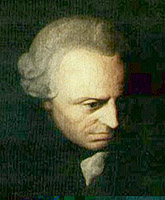
Many of you will go on from Rationalism and Empiricism to Kant, the third course in our history of philosophy sequence. The Kant course is required for all the advanced courses in the philosophy department. It is also required for the major, although non-majors are welcome to take it. If you plan to major in philosophy, or if you want to leave the door open for a major, we strongly recommend that you take Kant by the spring semester of your Junior year. (The spring semester of the Sophomore year gives you even more freedom, but is not always possible.) Students who do not take it until their Senior year will have trouble completing the major in time to graduate with their class. Kant is offered every spring.
Just as R&E builds on your knowledge of prior philosophy, especially Ancient Greek philosophy, the Kant course will build on the knowlege you are gaining in R&E. Reviewing the questions in this hand-out will help you prepare for Kant. The questions are limited to themes raised in R&E which are particularly important to Kant.
Who asserted which of these conclusions and who disagreed? What arguments have you encountered for and against the following conclusions?
- that experience is not the only source of knowledge
- that no account of matter (dead, extended substance) can explain mind (or soul, thinking substance)
- that the source of error is the body
- that the source of error is the mind
- that perception (or sensation) is infallible, and that only judgments about perception (or sensation) can err
- that perception is "pure" and occurs without any judgment or interpretation
- that some "perceived" qualities ascribed to objects are actually in the mind alone
- that some "perceived" relations ascribed to objects (preeminently, causation) are actually hypotheses, judgments, or inferences
- that some ideas we apparently do have (such as causation and infinity) cannot have originated in sensation
- that the mind makes a contribution to knowledge, and that this contribution is not to be considered error or invention
- that the "form" and "matter" of knowledge may be distinguished and traced to different sources
- that causation in nature does not necessarily exclude freedom of the will
- that sensation and understanding are distinct roughly as receptivity (passivity) and spontaneity (activity) are distinct
- that sensation and understanding are distinct roughly as immediacy and mediacy are distinct
- that sensation and understanding are distinct roughly as diversity and unity are distinct
- that sensation and understanding are distinct roughly as content and form are distinct
- that sensation (sensations, percepts) and understanding (ideas, concepts) are not distinct in kind, but only in degree (of vivacity, of compoundedness)
- that sensation and/or ideas are atomized, as it were, or "digital' in the modern sense, and come in bits that combine into larger complexes
- that coming to know is not a transition between radically distinct states, but is knowing more adequately what we already knew less adequately
- that knowledge is impossible without assistance from the deity
- that knowledge is impossible without rules or structures; that unstructured perception (say) would be unintelligible
- that knowledge of the self is privileged, or more certain and more complete than knowledge of other things
- that the privileged or prior knowledge of the self does not make solipsism inevitable
- that the self (or any other existing thing) is either not identical through time, or cannot be known to be identical through time
- that the perceiving self is either not identical through the diversity of perceptions, or cannot be known to be identical through the diversity of perceptions ("states of mind")
- that something like Reason (or intuition, revelation, the natural light) is privileged and can disclose truths with certainty even when no proofs are possible
- that truth and certainty are distinct, and perhaps independent, but that methodical philosophy must seek both
- that all we know are our own ideas
- that the correspondence of ideas to ideata (the referents of ideas) cannot be tested or confirmed
- that philosophy ought to be scientific (say, on the model of Newton), and that it can be
- that non-assertive, non-dogmatic, skeptical, or negative points of departure for inquiry somehow certify the results of inquiry better than other points of departure
- that philosophy cannot be done properly until we have inquired into the tool, instrument, or medium of philosophy: reason
- that methods, criteria, and instruments have to be certified but can only be certified by methods, criteria, and instruments
- that all differences in doctrine among philosophers can be traced to differences in method
![[Blue
Ribbon]](/~peters/blueribbon.gif)